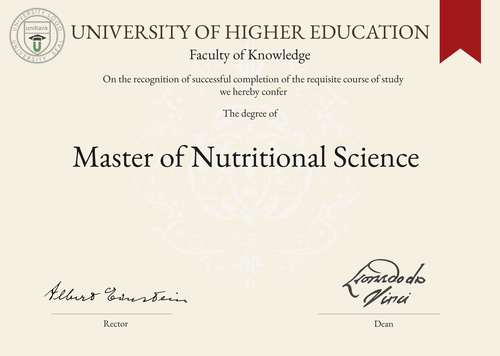
Master of Nutritional Science (MNS)
Guide to Master of Nutritional Science Program/Course/Degree
Master of Nutritional Science (MNS)

Program Name:
Master of Nutritional ScienceProgram or Degree abbreviation:
MNSDuration range:
The duration of the Master of Nutritional Science program can vary depending on the country or university. Typically, it ranges from 1 to 2 years.Tuition range:
The tuition fees for the Master of Nutritional Science program can vary based on the country or university. The range can vary from affordable to expensive, depending on the location and reputation of the institution.Overview:
The Master of Nutritional Science program is designed to provide students with an in-depth understanding of the field of nutrition and its impact on human health. This program combines theoretical knowledge with practical skills to prepare graduates for careers in nutrition research, public health, clinical practice and more.Curriculum Overview by year:
The curriculum of the Master of Nutritional Science program is structured to cover various aspects of nutrition and related subjects. The coursework typically includes subjects such as advanced human nutrition, nutritional biochemistry, food science, research methods and clinical nutrition. Students may also have the opportunity to specialize in areas such as sports nutrition, community nutrition, or dietetics.Key Components:
The key components of the Master of Nutritional Science program include gaining a comprehensive understanding of the role of nutrition in human health, developing research and analytical skills, learning about the latest advancements in the field and applying knowledge to real-world scenarios through internships or research projects.Career Prospects:
Graduates of the Master of Nutritional Science program have a wide range of career prospects. They can work as nutritionists, dietitians, research scientists, public health professionals, consultants, educators, or in the food industry. They may find employment in hospitals, research institutions, government agencies, non-profit organizations, or private practice.Salary Expectations:
The salary expectations for individuals with a Master of Nutritional Science degree can vary depending on factors such as job role, experience, location and industry. Generally, professionals in this field can earn competitive salaries, with the potential for growth as they gain more experience and expertise. For a more accurate understanding of salary expectations, you can utilize the Job Sites Search Engine, from our sister site jobRank, which searches over 4,600 job sites worldwide. Make sure to specify not only the job title but also the country you are interested in.Conclusions:
It is important to note that the duration, tuition fees, curriculum, key components, career prospects and salary expectations of the Master of Nutritional Science program can vary based on the chosen country or location of study, as well as the chosen university. Prospective students are advised to research and compare different programs and institutions to find the best fit for their goals and preferences. Visitors interested in pursuing a Master of Nutritional Science degree can use the uniRank World Universities Search Engine to explore and find information about universities offering this specific degree program anywhere in the world.World Universities Search Engine
search for Master of Nutritional Science (MNS) and add the Location (country, state etc.) or specific University you are interested in studying at.
Query examples:
- Master of Nutritional Science (MNS) United States
- Master of Nutritional Science (MNS) United Kingdom online
- Master of Nutritional Science (MNS) Australia international students
- Master of Nutritional Science (MNS) University of California
- Master of Nutritional Science (MNS) University of London tuition fees
- Master of Nutritional Science (MNS) University of Sydney scholarships
Share Program/Course
Interesting? Share this program/course/degree info with your friends now.